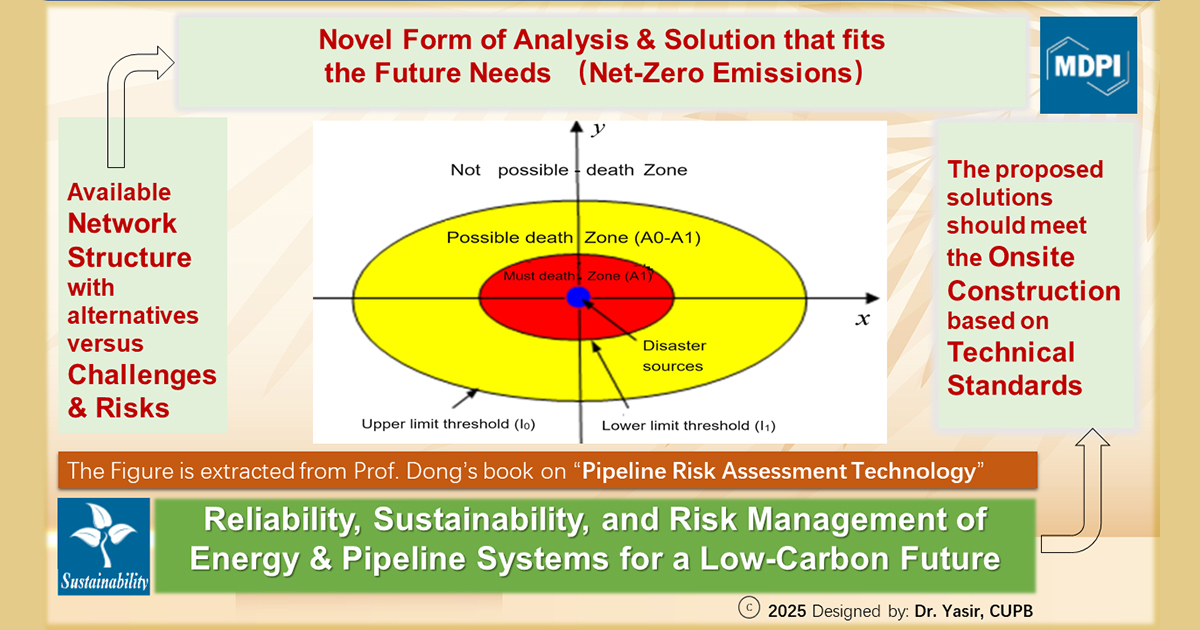- 3.3Impact Factor
- 7.7CiteScore
- 20 daysTime to First Decision
Reliability, Sustainability and Risk Management of Energy and Pipeline Systems for a Low-Carbon Future
This special issue belongs to the section “Energy Sustainability“.
Special Issue Information
Dear Colleagues,
This new Special Issue is a collection of scientific and applied research papers with many successful case studies addressing quantitative and semi-quantitative evaluations and mitigation measures in the energy industry based mainly on big data conducted to enrich the academic libraries of the world. This Special Issue thoroughly examines the development of the reliability, sustainability, and risk management of energy and pipeline systems for a low-carbon future. It divides the creation of the integrity system into management system creation and technological development and the prediction of the future development trend of energy and pipeline integrity management systems under the theme of “striving to build a full life cycle of smart energy and pipeline networks”, which has important practical value for the technological innovation and management innovation of energy and pipeline enterprises.
For instance, renewable energy sources such as hydrogen are now essential for sustainable energy systems due to the shift to a low-carbon energy future. Converting existing oil and gas pipelines for renewable energy transportation is one practical and affordable way to boost the energy economy while utilizing current infrastructure investments. Therefore, interested researchers are encouraged to offer research findings that benefit the global energy business through a comprehensive analysis of technical, economic, and strategic considerations. On the other hand, we intend to perform a thorough cause analysis, provide a comprehensive overview of various industrial hazards and challenges, and elaborate on risk assessment technology advancements, risk factor identification techniques, risk acceptability indicators, high-consequence area identification and evaluation, regional-level risk assessment, and other technical contents. We also propose semi-quantitative/quantitative risk assessments of energy onsite locations, including underground storage tanks, station distribution and booster stations, energy storage depots, and various facilities, among others.
Thus, safety, risk management, condition monitoring, early fault detection, and effective prediction measures in climate change scenarios are among the focal points of this Special Issue. It, finally, serves as a resource for researchers, management, and technical personnel.
To sum up, our mission to inspire experts, researchers, and students requires us to collect up-to-date topics on the reliability, sustainability, and risk management of energy and pipeline systems around the globe. Hence, in this Special Issue, original research articles and reviews are welcome. Research areas may include (but are not limited to) the following list:
- Safety Science and Engineering;
- Energy Performance;
- Renewable Energy;
- Smart Structures;
- Nanotechnology;
- Materials Characterization;
- Modeling and Simulation;
- Sensitivity Analysis;
- Risk Assessment;
- Environmental protection;
- Smart Pipelines Networks;
- New Eco-Fuel;
- Net-zero Emissions;
- Climate Change;
- Waste-to-Energy Technology Selection;
- Optimization.
We look forward to receiving your contributions.
Prof. Dr. Shaohua Dong
Dr. Issam M. Ali Aljubury
Prof. Dr. Milos Stankovic
Prof. Dr. Yasir M. F. Mukhtar
Guest Editors
Manuscript Submission Information
Manuscripts should be submitted online at www.mdpi.com by registering and logging in to this website. Once you are registered, click here to go to the submission form. Manuscripts can be submitted until the deadline. All submissions that pass pre-check are peer-reviewed. Accepted papers will be published continuously in the journal (as soon as accepted) and will be listed together on the special issue website. Research articles, review articles as well as short communications are invited. For planned papers, a title and short abstract (about 250 words) can be sent to the Editorial Office for assessment.
Submitted manuscripts should not have been published previously, nor be under consideration for publication elsewhere (except conference proceedings papers). All manuscripts are thoroughly refereed through a single-blind peer-review process. A guide for authors and other relevant information for submission of manuscripts is available on the Instructions for Authors page. Sustainability is an international peer-reviewed open access semimonthly journal published by MDPI.
Please visit the Instructions for Authors page before submitting a manuscript. The Article Processing Charge (APC) for publication in this open access journal is 2400 CHF (Swiss Francs). Submitted papers should be well formatted and use good English. Authors may use MDPI's English editing service prior to publication or during author revisions.
Keywords
- safety
- energy and pipeline systems
- reliability
- sustainability
- risk assessment
- low-carbon
- modeling and simulation
- environmental protection

Benefits of Publishing in a Special Issue
- Ease of navigation: Grouping papers by topic helps scholars navigate broad scope journals more efficiently.
- Greater discoverability: Special Issues support the reach and impact of scientific research. Articles in Special Issues are more discoverable and cited more frequently.
- Expansion of research network: Special Issues facilitate connections among authors, fostering scientific collaborations.
- External promotion: Articles in Special Issues are often promoted through the journal's social media, increasing their visibility.
- e-Book format: Special Issues with more than 10 articles can be published as dedicated e-books, ensuring wide and rapid dissemination.

